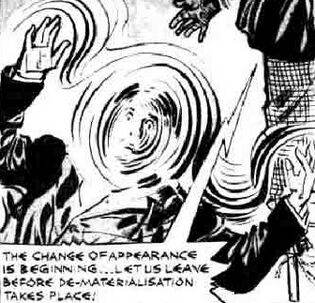Change of appearance: Difference between revisions
No edit summary |
|||
| Line 1: | Line 1: | ||
{{First pic|SecondRegen.jpg|[[Animated scarecrow (The Night Walkers)|Animated scarecrow]] instigate the [[Second Doctor's change of appearance]]. ([[COMIC]]: ''[[The Night Walkers (comic story)|The Night Walkers]]'')}} | {{First pic|SecondRegen.jpg|[[Animated scarecrow (The Night Walkers)|Animated scarecrow]] instigate the [[Second Doctor's change of appearance]]. ([[COMIC]]: ''[[The Night Walkers (comic story)|The Night Walkers]]'')}} | ||
'''"Change of appearance"''' was, by some early accounts, the term used to describe [[regeneration|the Time Lord process of changing bodies]]. ([[TV]]: ''[[The War Games (TV story)|The War Games]]'', etc.) | '''"Change of appearance"''' was, by some early accounts, the term used to describe [[regeneration|the Time Lord process of changing bodies]]. ([[TV]]: ''[[The War Games (TV story)|The War Games]]'', etc.) The [[War Master]] identified '''alteration of physiognomy''' as a side-effect of regeneration. ([[AUDIO]]: {{cs|Day of the Master (audio story)}}) | ||
== History == | == History == | ||
Revision as of 04:31, 27 September 2024
"Change of appearance" was, by some early accounts, the term used to describe the Time Lord process of changing bodies. (TV: The War Games, etc.) The War Master identified alteration of physiognomy as a side-effect of regeneration. (AUDIO: Day of the Master [+]Loading...["Day of the Master (audio story)"])
History
Upon coming into contact with the Second Doctor, the War Chief observed that he had changed his appearance. In the Doctor's trial, the First Time Lord referred to the First Doctor's renewal as a change of appearance, and sentenced the Second Doctor to undergo the process once more. (TV: The War Games [+]Loading...["The War Games (TV story)"]) A previous account, however, had described this process as a "strange psychological storm" which rejuvinated Dr. Who, with the change of personality being almost a side effect. (PROSE: The Phoenix in the Tardis [+]Loading...{"page":"20","1":"The Phoenix in the Tardis (feature)"}) The Time Lords had the ability to let the Doctor choose the appearance he'd change into. (TV: The War Games [+]Loading...["The War Games (TV story)"]) The animated scarecrows who initiated the Second Doctor's transformation also called it a change of appearance. (COMIC: The Night Walkers)
Following the trial and transformation, the Third Doctor recovered from his "total change of appearance". (PROSE: Lourdwater Cottage Hospital case summary) Alistair Gordon Lethbridge-Stewart also mentally referred to the transformation as a change of appearance. (PROSE: Doctor Who and the Auton Invasion)
When remembering the trial, the President of the Time Lords recalled that the Doctor had been sentenced to a change of appearance. (PROSE: The Three Doctors) During the First Omega Crisis, Lethbridge-Stewart initially believed that the Third Doctor had changed his appearance back into the Second Doctor when he appeared before learning that he had come from the past. (TV: The Three Doctors)
When observing the Third Doctor's regeneration, Lethbridge-Stewart was reminded of the Second Doctor's change of appearance, and used similar language for the Third Doctor's change. (PROSE: Doctor Who and the Giant Robot) Sarah Jane Smith later remembered knowing the Doctor both before and after his "change of appearance". (PROSE: Doctor Who and the Pyramids of Mars)
During the Planetary Relocation Incident, the Tenth Doctor was forced to regenerate after being shot by a Dalek but prevented a change of appearance by siphoning the remaining regeneration energy into his severed hand after healing himself, resulting in a Human-Time Lord Meta-Crisis which created the Meta-Crisis Doctor and the DoctorDonna. (TV: The Stolen Earth/Journey's End) Recognising that this act still expended the eleventh regeneration of the First Doctor's regeneration cycle, the Eleventh Doctor recalled to Clara Oswald that "number ten once regenerated and kept the same face", which he attributed to "vanity issues". (TV: The Time of the Doctor)

